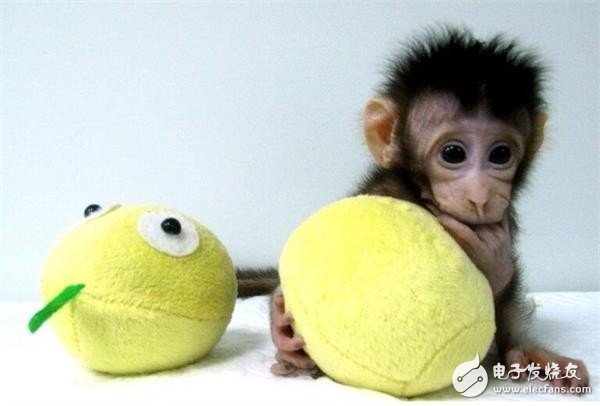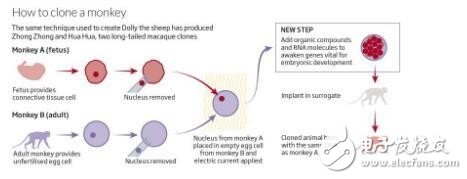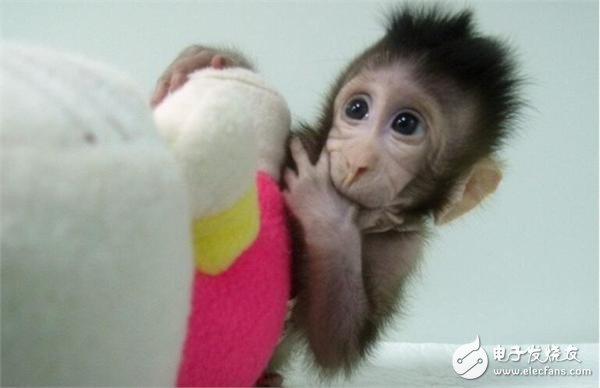Two cloned monkeys are born: cancer is expected to be cured, a major breakthrough in world life sciences
Two cloned monkeys were born! Zhongzhong Huahua, the first monkey in the world to be successfully cloned using the cloned sheep Dolly technology. Two macaques were born less than 10 weeks and are currently very healthy. This is also a major breakthrough in the world of life sciences.
Their "story" is on the cover of the internationally authoritative academic journal Cell, which means that Chinese scientists have successfully broken through the world's problems that the existing technology cannot clone primates.
The female long-tailed macaque represents a technical milestone. It represents the ability to create customizable and genetically identical monkey populations that accelerate the treatment of diseases such as Parkinson's, Alzheimer's disease and cancer. But this breakthrough will inevitably raise concerns that cloning humans is closer than ever.
The Chinese team that cloned monkeys said that these monkeys have such great potential because they all inherit the same genetic material.
This will enable scientists to modulate monkey-related genes in human disease and then monitor how these changes alter the animal's biological properties and compare it to animals that are identical to the altered genes. The team said it could speed up the search for genes and processes that have gone wrong in these diseases, as well as ways to correct them.
Although 23 mammals have been cloned, including pigs, cats, dogs, mice and cattle, there has been no difficulty in overcoming the closest non-human primate clones to humans. Scientists have generally believed that prior art cannot clone primates.
In 2000, the researchers cloned monkeys for the first time, but by splitting the embryos after fertilization, basically only one twin with the same gene was produced. This method can only be used to create up to 4 identical animals.
Now, Sun Qiang and his colleagues at the Institute of Neuroscience of the Chinese Academy of Sciences in Shanghai have adjusted the technique used to clone Dolly, creating a theoretically unlimited number of clones.

Called somatic cell nuclear transfer, the method involves removing the nucleus from the donor egg cell and replacing it with a nucleus taken from the cells of another animal.
Current is used to deceive the egg, which is thought to have been fertilized and begins to develop into early embryos. When implanted in the uterus of an alternate mother, the embryo will grow as a copy of the animal that donated the nucleus (see figure).
Previous attempts to do this in monkeys have never broken through the early embryonic stages known as blastocysts.
Sun Qiang and his colleagues further studied two new nutrients and growth factors that help cloned embryos grow before they are implanted. These components, messenger RNA and a compound called trichostatin A, awaken at least 2,000 genes that are essential for each stage of embryonic development, allowing development to continue.
The team also found that cloning macaques is easier if cells from fetal macaques are used instead of adult macaques. Both Zhonghua and Huahua are created with cells destined to form connective tissue, which are extracted from aborted female fetuses.
A total of 79 embryos were implanted into 21 alternatives. The monkey was the only surviving of six pregnancies. Dolly was the only successful 277 implanted embryo.

Although attempting to extract cells from adult macaques for this technique also produced two living animals, they all died shortly after birth and one was abnormally developed.
In 2014, Robert Lanza, chief scientist at the Institute for Regenerative Medicine in Astellas, Massachusetts, said: "For many cell types, reprogramming is more difficult for adult cells than for fetal cells." Human adult skin cells were cloned for the first time. This is the case.
This technical barrier may quell the fear that people often express after successful cloning: it may evoke the plot of the movie "Escape the Island" - clones in science fiction are created for the extra organs.
After the cloning of Santo Dolly, the Rael movement in California (atheist organization) claimed that it had cloned human babies. It set up a company called Clonaid, but it is considered a scam.

Peter Andrews of the University of Sheffield in the United Kingdom said: "This may be a step in cloning people, but why are you doing this? "In terms of human biology, it is illegal to clone people in the UK and many other countries. I don't think anyone will do this rationally. â€
The Chinese research team said the focus is on using cloned monkeys to create better animal models of disease to accelerate medical treatment.
Andrews said the concept has its value, especially considering the long-term difficulties of simulating complex diseases like Alzheimer's and Parkinson's disease in mice.
To date, all the therapies for treating Alzheimer's disease-like symptoms in mice have failed in human trials. One potential cause of repeated failures is that the mouse model of Alzheimer's disease is not close enough to the human version of the disease.
It is now possible to better mimic the Alzhai of cloned monkeys by knocking out genes that have similar effects in monkeys and humans, such as genes that trigger the production of beta-amyloid plaques that block Alzheimer's brain. Silent illness.
China plans to accelerate the development of medical treatment by studying cloned and genetically modified monkeys.
At a meeting in May 2016, Pu Muming of the Shanghai Institute of Neuroscience published the world's first transgenic monkey with Parkinson's disease and proposed an ambitious plan to expand monkey use to study neurodegenerative diseases. .
Soon after, he also put forward the same point in "New Scientist", saying that because monkeys are so closely related to us, advanced in thinking, and complicated in social networks, they will tell us more about brain diseases than mice. information.
"This is a major breakthrough in the world of life sciences in recent years." Academician Pu Muming, director of the Institute of Neurology of the Chinese Academy of Sciences, said that the success of cloning monkeys will be brain diseases such as Alzheimer's disease and autism, as well as immunodeficiency, tumor and metabolism. The mechanism research, intervention, diagnosis and treatment of diseases bring unprecedented bright prospects.
Plug-In Connecting Terminals,Insulated Spade Terminals,Cable Connector Double Spade Terminals,Vinyl-Insulated Locking Spade Terminals
Taixing Longyi Terminals Co.,Ltd. , https://www.txlyterminals.com